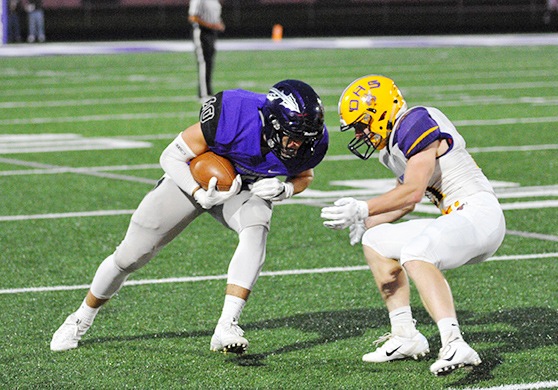Nutritional Value: Fueling athletes before practices, workouts
It’s common that many athletes show up for practice less than adequately fueled.
Subpar workouts and missed training days can often be traced back to poor eating habits. Assist the athletes you guide by emphasizing the pre-workout meal as a key element to quality training sessions and consistent performances. Foods and beverages consumed before exercise should be viewed as an opportunity to fine-tune the body’s carbohydrate and fluid levels, and to ensure the athlete feels comfortable and confident throughout the workout.
 Be sure to encourage all athletes to experiment to find the timing, amount and makeup of pre-workout meals that best suits their individual needs.
Be sure to encourage all athletes to experiment to find the timing, amount and makeup of pre-workout meals that best suits their individual needs.
What to eat
Food consumed before exercise is only useful once it has been digested and absorbed. This means athletes need to time their food intake so that the fuel becomes available during the exercise period.
The time required for digestion depends on the type and amount of food consumed. Foods higher in fat, protein and fiber tend to take longer to digest than other foods This can increase the risk of stomach discomfort during exercise. Large quantities of foods take longer to digest than smaller quantities.
Generally, solid food is better tolerated before lower-intensity activities or sports where the body is supported (e.g., swimming and cycling) than sports that involve running where the digestive tract is jostled about during exercise. A general guideline to share with athletes is to eat a balanced meal containing carbs, protein and fat about three to four hours before exercise. If the time period is less than that — one to two hours — opt for a lighter carb-rich snack accompanied by protein.
Foods eaten before exercise should provide ample carbohydrates, the preferred fuel source for the body and brain. The best choices close to the start of exercise should be low in fat and moderate in fiber to make digestion easier and to reduce the risk of gastrointestinal discomfort. For most exercise sessions, the emphasis is on carbohydrate and fluid for the pre-workout meal.
The following foods are suitable to eat three to four hours before exercise:
- Peanut butter sandwich with flavored low-fat milk
- Baked potato, cottage cheese and a glass of low-fat milk
- Oatmeal or breakfast cereal with low-fat milk and a small handful of nuts
- Sandwich or tortilla with cheese/meat filling and a banana
- Salad (with protein like chicken, turkey, lean red meat, tuna or egg), low-fat salad dressing and fruit yogurt
- Pasta or rice with a sauce based on low-fat ingredients (e.g. tomato, vegetables, lean meat)
The following snacks are suitable to eat one to two hours before exercise:
- Liquid meal supplement (e.g., Ensure, Boost)
- Low-fat milk shake or fruit smoothie
- Sports bars (check labels for carbohydrate and protein content)
- Breakfast cereal with low-fat milk
- Cereal bar(s)
- Fruit yogurt
- Fruit
The following foods are suitable to eat less than one hour prior to exercise:
- Sports hydration drink
- Carbohydrate gels/blocks/chews/shots
- Sports bars (primarily carbohydrate)
- Carbohydrate-rich real food as tolerated (e.g, banana, juice); It depends on intensity of exercise planned
Special circumstances
• Early morning workout. Eating three to four hours before exercise isn’t always practical. Athletes who train early in the morning do best with a light snack about an hour before exercise. A piece of toast, fruit or a cereal bar on the way to the gym, along with juice or a carton of low-fat milk. If needed, athletes can make up for a smaller carbohydrate intake prior to exercise by consuming carbohydrate during the workout (e.g., sports drink or energy gel).
 • Too nervous to eat. Athletes perform better when they are fueled and hydrated, and the pre-workout meal plays an important role in achieving these goals. Support athletes as they experiment to find a routine, based on foods that are safe and familiar. Liquid meal supplements, such as Ensure or Boost, provide an alternative for anyone who has difficulty tolerating solid foods pre-exercise.
• Too nervous to eat. Athletes perform better when they are fueled and hydrated, and the pre-workout meal plays an important role in achieving these goals. Support athletes as they experiment to find a routine, based on foods that are safe and familiar. Liquid meal supplements, such as Ensure or Boost, provide an alternative for anyone who has difficulty tolerating solid foods pre-exercise.
• Carb-sensitive prior to exercise. When the start of exercise coincides with extra carbohydrate use (as naturally occurs any time carbs are consumed), it’s normal for a small dip in blood sugar to occur. In most people, this is a temporary event, which is quickly corrected by the body without any side effects. Most athletes, therefore, are able to consume carbohydrates in the 30 to 60 minutes before exercise without any negative effects on performance.
In a small percentage of individuals, the drop in blood sugar is greater, or the athlete is sensitive to the change. As they begin to exercise, they experience shakiness, dizziness and pronounced fatigue. Athletes affected in this way need a longer period between eating and exercising. If they do need to eat close to exercise, there is some evidence to suggest that small amounts of carbohydrate (<50 grams) are more likely to cause problems in sensitive individuals than larger amounts (70 grams). This is likely because the small intake of carbohydrate is swamped by the body’s increased use of carbohydrates.
A larger intake compensates for the greater rate of use, leaving the athlete with a net gain in available carbohydrates. Athletes also can compensate by waiting to consume carbohydrates until they have been exercising for five to 10 minutes. A warm-up that includes some high-intensity activity can help as it stimulates glucose release from the liver and prevents blood sugar levels from dropping too low.





